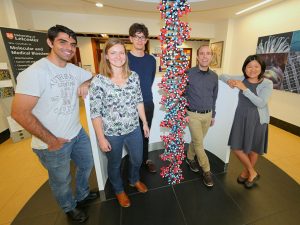Early-onset Parkinson’s Patients May Benefit from More Niacin in Diet
Written by |

Vitamin B3 (niacin) was found to boost levels of a compound called NAD that generates energy and repairs DNA, according to new research that suggests boosting Vitamin B3 could keep Parkinson’s disease (PD) at bay.
A University of Leicester team of researchers, funded by the Medical Research Council (MRC), led the study, which looked for therapeutic potentials of dietary interventions.
The study, “Enhancing NAD+ salvage metabolism is neuroprotective in a PINK1 model of Parkinson’s disease,” was published in Biology Open.
The team found that Vitamin B3, existing in a series of foods, including meats and nuts, could boost levels of NAD, which is critical for keeping healthy mitochondria, the powerhouses of cells.
DNA repair, however, is NAD-consuming, and drugs that block NAD-consuming DNA repair already are being used in some cancer treatments.
“Parkinson’s disease occurs when dopaminergic neurons in a part of the brain called the substantia nigra are lost. This can happen for a variety of reasons, but in some hereditary cases, the main problem is unhealthy mitochondria [the organelles that power the cell],” Miguel Martins, the study’s lead investigator from MRC’s Toxicology Unit, said in a press release. “Mutations in genes such as PINK1 prevent cells from clearing out the defective powerhouses. When they accumulate, neurons can’t get enough energy and die. The faulty mitochondria also release toxic molecules that damage their genes encoded by DNA,” Martins said.
The research team used fruit flies with a particular mutation that mimics the human disease. The study unveiled a mechanism for how early-onset PD impacts the brain, and opened new pathways to potential drug therapies that could help this particular group of patients.
NAD is a compound that not only generates energy, but also repairs DNA. The researchers wondered if, in cases of PD, with all the mitochondrial damage going on, the molecule could result in an insufficient supply.
To dig deeper into this hypothesis, the neuroscientists fed fruit flies with the mutated PINK1 gene food strengthened with Vitamin B3, which is transformed into NAD when inside the body.
They found that, with the additional source of NAD, the flies didn’t have as many faulty mitochondria as their mutant counterparts did with a normal diet. Plus, the Vitamin B3 also prevented neuron loss in the same flies.
Moreover, the researchers examined if preventing NAD from getting depleted due to DNA repair would protect the flies from PD. They found that switching off this genetic function kept mitochondria healthy and neurons alive. They also found that the flies were stronger, with higher mobility levels, and lived longer.
“The results suggest that in familial Parkinson’s, available NAD is critical for keeping mitochondria in shape and the disease at bay. Drugs that block NAD-consuming DNA repair already exist to treat cancer. Loading up on niacin probably can’t hurt either,” Martins said. “While neither of these would be cures, they would expand treatment options for Parkinson’s patients with faulty mitochondria. This study strengthens the therapeutic potential for Vitamin B3/niacin-based dietary interventions and PARP inhibition in the treatment of Parkinson’s disease,” he said.






